What Dark Clouds Hide Read online
CONTENTS
Chapter I
Chapter II
Chapter III
Chapter IV
Chapter V
Chapter VI
Chapter VII
I
The boy lay on his mother’s lap as if fast asleep. He was too big for her: a strapping fair-haired lad, eight years old, stretched out across his mother’s scrawny thighs, with her arms round his waist and underneath his head, to hold it upright.
‘No,’ the mother said, almost inaudibly. ‘No. No. No.’
The boy’s left eye had disappeared into swollen tissue and dried blood.
‘No,’ the mother repeated.
Slowly, she raised her face to the ceiling and took a deep breath.
‘No!’
The scream filled the room so suddenly that the father took a step back. He held his head in both hands, a comical gesture underscored by turning to the wall and banging his head rhythmically on the pale wallpaper.
‘I should have kept a better eye on things,’ he groaned.
Thump. Thump.
‘It’s my fault. It’s all my fault. Keep an eye on things. Always keep an eye on things.’
Thump. Thump. Thump.
‘No!’ the mother screamed again.
The man turned to her once more.
Saliva dribbled from his lips. Blood oozed from one nostril, though he pretended not to notice. He allowed his arms to drop, his body crumpled inside the light-grey summer suit; he seemed to shrivel on the spot, allowing blood to drip on to his red tie and fade away.
Lowering her head to her son’s battered face, the mother attempted to pull his left arm across his body. It proved impossible. The arm was broken, apparently at the elbow joint itself.
A training shoe lay on the floor.
The other was still suspended from the boy’s foot, teetering from his toes; the blue, grubby shoe threatened to fall at any moment.
Size thirty-seven or thereabouts, Johanne Vik thought.
Eight years old and big feet. The heel and toe of his sock were worn thin.
‘No,’ the mother mumbled over and over again.
‘What happened?’ Johanne wanted to ask; she stood in the doorway trying to digest the scene that met her eyes.
The words would not come.
She forced some saliva into her mouth, smacking her lips and swallowing as she felt a faint vibration under her feet. A jolt, as if from a distant earthquake. Only for a second, and then it subsided.
Even the mother no longer uttered a sound.
‘What happened?’ Johanne eventually managed to ask.
‘I didn’t keep an eye on things,’ the father said, pointing with a limp hand to the stepladder in the middle of the spacious living room.
‘You didn’t keep an eye on things,’ the mother repeated mechanically into the boy’s bloodstained hair.
‘Are you sure he’s—’
Johanne tried to cross to the settee.
‘Don’t touch him!’ the mother yelled despairingly. ‘Don’t touch my little boy!’
‘We’re sure,’ the man said.
‘Then I think...’ Johanne began.
She should not think anything. Not think. Simply observe: the stepladder under a bare ceiling. No lamp up there, no hook, nothing to be righted or repaired: an out-of-place, high stepladder in a large, stylish, extremely tidy living room, where the dining table at the far end was all decked out for a party. Flowers everywhere. Wild flowers and garden roses in similar glass vases, and small posies between the place-settings on the table. Outside the picture windows the dull grey clouds hung low in the sky. Far below, in the city centre, Johanne could, however, make out a rising column of smoke, darker grey against the backdrop of the fjord in the far distance.
A living room decorated for a party.
A blue torch, she noticed, beside one leg of the stepladder, a dark-blue, large torch with Lightning McQueen painted on its side. A heap of old crayons: well used, grubby wax crayons piled up on the floor.
A dead boy.
The torch shed a beam of light.
Without entirely knowing why, Johanne stole a glance at the clock. It showed 15.28, and it was Friday 22 July 2011.
‘I must phone the police,’ she said softly.
‘The police,’ the woman whispered hoarsely. ‘What can the police do for my boy?’
‘It’s just that it has to be done,’ Johanne mumbled tonelessly. ‘I think that would be best.’
The truth was that she had no idea what else she could do.
Through the open verandah door she could hear sirens in the distance.
Lots of them. They seemed to be everywhere.
*
This was her fourth attempt. Johanne could not understand why the emergency number lacked sufficient staff to cope with a quiet Friday in the summer holidays.
‘Police emergency. What do you want to report?’
At last.
‘Hello. My name’s Johanne Vik.’
A momentary hesitation.
‘What’s it about?’ the woman at the other end of the line asked brusquely.
‘A death. A boy aged eight who—’
‘In the government quarter? Where?’
The woman on the line seemed agitated.
‘Do you see anyone from the rescue services anywhere nearby?’ she shouted.
‘No. The government quarter? I’m in Grefsen! At the house... I’m at my friends’ house and—’
‘In Grefsen?’
‘Yes.’
‘Whereabouts?’
‘They live in Glads vei.’
‘Professor Dahls vei?’
‘No, that’s not even in Grefsen!’
Johanne had gone down to the spacious hallway to make the call. Now she regretted that. The parents should not be left alone with the child. Should not be left alone at all. Slowly, as if doing something she really shouldn’t, she crept upstairs to the living room and dropped her voice.
‘I said Glads vei. G-L-A-D! Glads vei in Grefsen. A child has... There’s a dead child here. It looks like an accident, but—’
The call was cut off.
‘Hello?’ Johanne said.
No reply.
*
In the days that followed, Johanne often marvelled that she had actually been able to stand being there. Several times she had been obliged to leave the couple with the dead child on their own in the living room. The nausea that had overwhelmed her continually forced her out to the guest bathroom, accessed from the hallway. The first time she had to thrust two fingers all the way down to where she could feel her tongue rough and hard. Then sour bile and the remains of a hurried lunch spewed out automatically each time she leaned over the toilet bowl. The acid aftertaste was impossible to swallow, and the scent of jasmine no longer pervaded the bathroom.
The man and woman who had just lost their only child had sat down together on the settee. The boy was still stretched out on her lap. The father was permitted to place his arm round his wife’s shoulders, but every time he lifted his free hand to touch the boy, the mother again screamed: ‘No!’
Johanne was of no significance to them. They did not speak to her, and no longer replied to her questions. When she returned after her first visit to the toilet, the man had tidied the room. The stepladder was gone. The blood on the floor had been wiped away. The torch emblazoned with Lightning McQueen was nowhere in sight. Not the crayons, either. Johanne had been on the verge of tears as she again, and this time more insistently, reminded them that everything had to be left untouched until the police arrived. The man did not answer. Did not look at her. Did nothing other than sit stiffly beside his wife, staring at the boy.
Anyway, it was t
oo late.
The living room was clean and tidy, as if still anticipating cheerful party guests in a few hours’ time.
If only it hadn’t been for the dead child.
‘No,’ the mother mumbled almost soundlessly.
Ten past four, and Johanne still had not made contact with the police.
‘Adam,’ she muttered, tapping in his number.
After six rings she was transferred to his answerphone.
‘Phone!’ she whispered. ‘You must phone me. Right away. Right away!’
She struggled to remember her own home number. The landline was hardly ever used now. Eventually her fingers found the correct digits.
After ten rings with no answer, she disconnected the call.
The iPhone on the mantelpiece suddenly made an ear-splitting noise. Neither of the couple on the settee seemed to react.
‘Is that yours?’ Johanne asked, trying to catch the woman’s eye.
‘No,’ the mother mumbled into the boy’s hair.
‘Ellen,’ Johanne said, crossing over to the fireplace, ‘can I take this?’
Without waiting for a reply that would never come anyway, she picked up the iPhone and placed her thumb on the display.
‘Hello?’
‘Hi, Ellen.’ A female voice continued breathlessly, ‘It’s Marianne here. I thought I should check with you whether it’s not best to cancel the party now that—’
‘This isn’t Ellen. It’s Johanne.’
‘Johanne? Did I misunderstand...? I thought we were to come at seven o’clock!’
‘Yes, that’s right. I’m here to... I was supposed to help, and then—’
‘Then this terrible thing happened. And so I thought...’
Johanne used her finger and thumb to pinch the bridge of her nose.
‘Yes,’ she said under her breath, turning her back to the couple on the settee. ‘It’s dreadful. Absolutely horrendous. But how could you know?’
‘My sister’s married to a Muslim,’ Marianne said at the other end. ‘Two children. Two dark-skinned children! What’s it going to be like in this country now?’
Her voice cracked.
‘Muslim,’ Johanne repeated in a subdued tone. ‘I don’t quite understand what...’
Marianne swallowed audibly, before clearing her throat and speaking in a loud voice: ‘In any case, I can’t come now. The right thing would be to cancel the whole affair. Can you just let Ellen know? People won’t be in the mood to reminisce about schooldays, when something like this has happened. In Norway. In Oslo.’
‘Of course there won’t be any dinner party, but what—’
‘In our city, Johanne. In our city!’
‘Marianne—’
‘Have you seen the pictures? On TV? There must be hundreds of people dead! And my sister who’s—’
‘Marianne,’ Johanne said, this time in a sterner voice. ‘What on earth are you talking about? What is it they’re showing on TV? What’s happened?’
‘Don’t you know?’
‘No.’
‘Don’t you know that someone has blown half the city centre sky-high? A huge bomb, Johanne! Terrorists, they say, Muslim terrorists, and what’s now...’
Johanne was no longer listening. She heard nothing.
She stood with her back to the fireplace and her gaze turned to the settee. Now she let her eyes wander in the direction of the window. Beyond the rain-soaked rose bushes in the garden and the shabby districts separating Grefsen from the city centre, before the leaden waters of the fjord, all the way down there, slightly to the east of the City Hall’s blunt tower, the column of smoke had grown in size.
‘You know who’s supposed to come tonight,’ Johanne said slowly.
‘Yes, I was the one who prepared the guest list. All the girls from 3B, except—’
‘Call them. Cancel.’
‘Can’t Ellen—’
‘Please.’
‘But my sister—’
‘Call them, Marianne. Cancel it. Please. Can I rely on you?’
The line crackled and Johanne repeated: ‘Please, Marianne.’
‘OK. All right.’
‘You were the one who didn’t keep an eye on things,’ Ellen sobbed from the other side of the room.
The call was disconnected.
‘Ellen,’ Johanne said as calmly as she could, taking a few steps over to the macabre tableau on the settee. ‘I don’t think there’s any point in—’
Her words were interrupted by a door slamming loudly, startling her. The brittle sound of broken glass from her own mobile phone as it hit the floor was followed by rapid footsteps from the hallway and a voice humming as it approached the living room.
‘Hi,’ a man said cheerfully, throwing his arms wide. ‘Are you ready, Jon? That doorbell of yours isn’t working, just so you know.’
The man could hardly be more than thirty. He ran his hand through thick, mid-length hair more sun-bleached than the weather of the past few weeks might suggest. His tight-fitting, pale-blue T-shirt emphasized the suntanned hue of his skin. He was still smiling broadly, and he scrutinized Johanne with rapidly diminishing interest, before taking a couple of steps across to the settee.
‘Hi there, Tarzan,’ he said, grinning, to the boy. ‘Shall we—’ He was brought up short. ‘What the blazes—’
‘No,’ Ellen murmured.
‘What the hell?’ the man said, panting. ‘Jon! Jon, for fuck’s sake, what’s wrong with Sander?’
‘Sander’s dead,’ Johanne said. ‘I’ve been trying to get hold of the police for ages, but they—’
‘Dead? What do you mean...? Don’t kid about! Jon! Answer me, won’t you? What’s wrong with you both? What’s wrong with—’
‘No,’ Ellen whispered.
‘I didn’t keep an eye on things,’ Jon reiterated in a monotone.
‘The police,’ Johanne said in a loud voice, picking up the shattered pieces of the mobile phone. ‘We need to get hold of the police, but they’re obviously busy with this...explosion in the city centre.’
‘Explosion?’ the man echoed. ‘What explosion? What has happened to Sander and what—’
He raised one foot to step towards the settee, but changed his mind, instead standing transfixed.
Johanne took a deep breath.
‘We need to get in touch with the police,’ she said yet again. ‘But there’s obviously been a major...event in the city centre, so they’re busy dealing with that. I suggest that you...’
She stared at the young man.
‘Joachim,’ he said huskily. ‘My name’s Joachim. Jon, Sander and I were to... I mean, Ellen was holding a party, you see, and we—’
He was unable to continue. Johanne could see that his blue eyes were welling up with tears and he found it impossible to wrench his gaze from the dead boy.
‘You stay here,’ she said. ‘Don’t move anything. Don’t touch...Sander. I’ll go down to the kitchen and phone all the police personnel I can think of. I’ll borrow your phone, Ellen.’
The boy’s mother did not reply.
‘Stay!’ Johanne said sharply to all of them, as if speaking to a pack of unruly dogs. ‘Stay here, and don’t touch anything.’
With a broken mobile phone in one hand and Ellen’s iPhone in the other, she headed for the door. A faint whiff of aftershave brushed her nostrils as she passed Joachim. It smelled expensive, and he had an exclusive cashmere sweater slung over his shoulders, knotted at the front.
Fifty-five minutes had passed since her arrival.
And in the distance, to the south, the sirens wailed incessantly.
*
The police officer’s uniform was too large for his skinny frame. His hair was thick, blond and recently cut, above a smooth face with child-like red lips. His Adam’s apple bobbed up and down in a rhythm that, in other circumstances, would have made Johanne laugh. The black epaulettes with single gold star informed her that he was a constable. Newly graduated from Police College,
was Johanne’s guess. Not exactly what she had been hoping for, but better than nothing.
Or perhaps not.
‘What has happened here?’ he asked, looking at Johanne as his left forefinger twice rubbed the side of his nose before he somehow stood stiffly to attention again.
‘I don’t know. When I got here, round about quarter past three, the boy was dead.’
‘I see.’
The young police officer now fixed his eyes on Joachim, leaning against the fireplace with his arms folded across his chest.
‘I came even later,’ Joachim said dispassionately. ‘I don’t know anything.’
‘Well then,’ the policeman said, swallowing.
Silence descended on the room. Joachim had closed the verandah door some time earlier, and it was no longer possible to hear the sirens in the city. Only Ellen’s monotonous sobbing, interspersed with the occasional ‘No’, broke a silence so oppressive that Johanne felt perspiration trickle between her shoulder blades. The policeman continued to stare at her, as if he expected her to speak up, to take charge, to put things right. It felt uncomfortable.
‘The boy,’ she suggested sotto voce, looking at him. ‘He’s called Sander. He should really have a post-mortem. It’s normal procedure.’
She tried to sound more certain than she felt.
‘Yes,’ he said, nodding. ‘We need to arrange for an ambulance.’
‘As far as I understand, they’re all spoken for.’
‘Yes. The explosion, of course.’
Nodding, he stared at the boy, still lying on his mother’s lap. The Adam’s apple continued to bob up and down.
‘I can drive him,’ Joachim suggested hesitantly. ‘It’s at the National Hospital. Isn’t it?’
‘I guess so,’ the police officer said, drawing his words out as he scratched his neck with a sharp index finger. ‘Grefsen does come under Ullevål, I suppose. I think maybe—’
What he thought never became quite clear.
Yet another man entered the living room.
‘I rang the doorbell,’ the new arrival said. ‘Since no one answered, I came right in. I’m Kalle Hovet!’
He offered his hand to the young Constable, who accepted it diffidently.
‘Police Prosecutor Kalle Hovet,’ he explained succinctly. ‘My colleague Silje Sørensen called and asked me to come here. I live in Kjelsås, just close by. She had received a phone call. From you, I assume?’

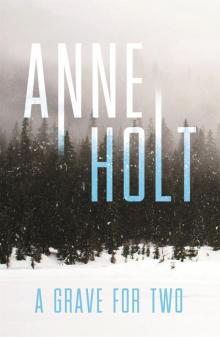 A Grave for Two
A Grave for Two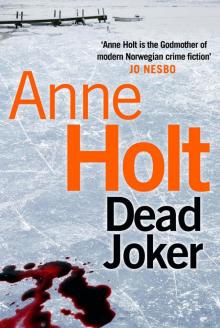 Dead Joker
Dead Joker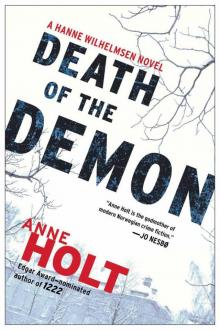 Death of the Demon: A Hanne Wilhelmsen Novel
Death of the Demon: A Hanne Wilhelmsen Novel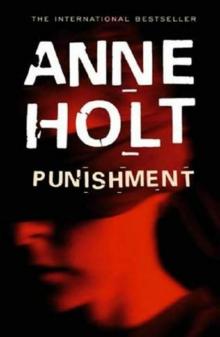 Punishment aka What Is Mine
Punishment aka What Is Mine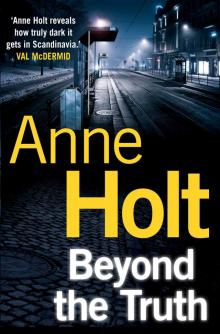 Beyond the Truth
Beyond the Truth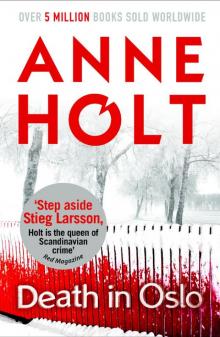 Death in Oslo
Death in Oslo The Blind Goddess
The Blind Goddess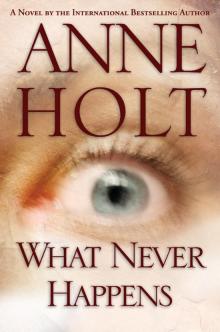 What Never Happens
What Never Happens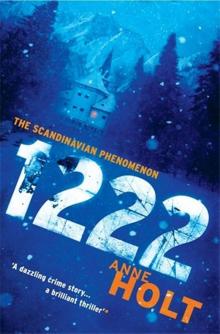 1222
1222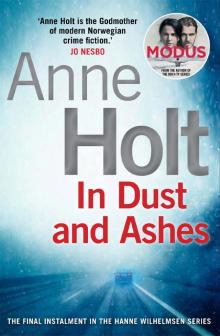 In Dust and Ashes
In Dust and Ashes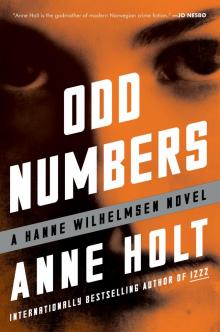 Odd Numbers
Odd Numbers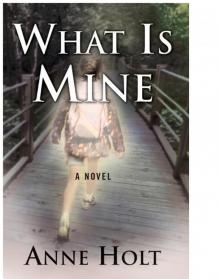 What is Mine
What is Mine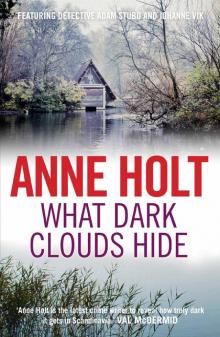 What Dark Clouds Hide
What Dark Clouds Hide Blessed Are Those Who Thirst
Blessed Are Those Who Thirst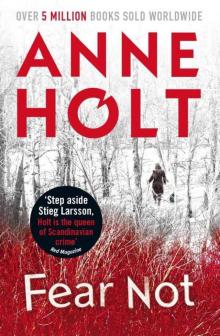 Fear Not
Fear Not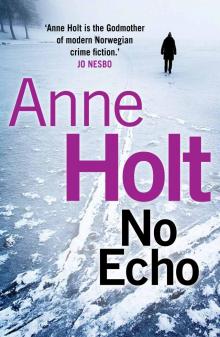 No Echo
No Echo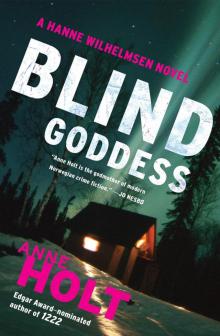 Hanne Wilhelmsen - 01 - The Blind Goddess
Hanne Wilhelmsen - 01 - The Blind Goddess